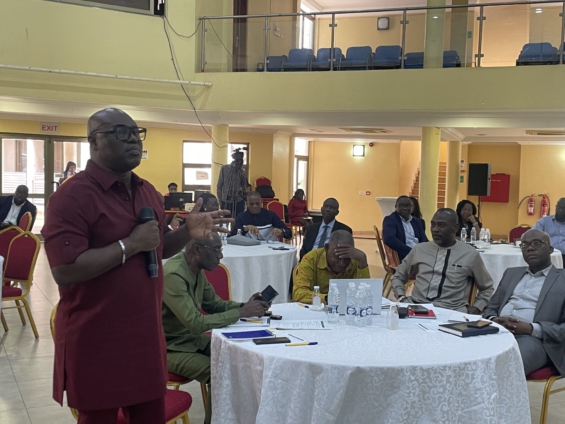The Administrator of the Ghana Education Trust Fund (GETFund), Dr Richard Ampofo Boadu, has debunked claims that the fund gives out scholarships on political considerations.
He said they awarded scholarships to applicants on merit, adding that, their system of offering scholarships was “very” transparent and open.
Dr Boadu said this in reaction to a comment during an open forum discussion on “Financing Higher Education in Ghana: Implications for Equity and Sustainability" organised by the Ghana Academy of Arts and Sciences (GAAS) in Accra.
The policy dialogue was the second of seven policy dialogues the Academy was organising under the project “Motivating Higher Education Reforms in Ghana - Towards Equity and Sustainability, funded by a grant from Carnegie Corporation of New York.”
The goal of the Academy's Higher Education Project is to provide a platform for independent people and groups to reflect on the challenges of the higher education sector on a regular and sustained basis.

The GETFund Administrator urged tertiary institutions to find innovative ways to raise funds to augment the support they received from the government.
He said the government alone could not entirely fund the running of those institutions, hence, they needed to devise alternative sources of funds.
Mr Kofi Asare, Executive Director of Africa Education Watch, an education policy think tank, called for the creation of a scholarship authority to merge all scholarship-providing entities in the country.
“The reason we are not meeting our tertiary enrollment target is due to actual needy students not gaining scholarships into tertiary institutions. The scholarship system and rollouts should be reviewed.”

“We need a scholarship authority to manage all scholarships in the country and make scholarship rollouts more efficient and effective to help needy students and even prospective students enroll in tertiary institutions,” he added.
Professor Emeritus Takyiwaa Manuh, Chairperson, of GAAS’ Higher Education Project Management Committee, said funding for higher education in Ghana had suffered perennial challenges of inadequate government subventions, insufficient student loans, inadequate tuition fees, infrastructural and equipment deficits, and unreliable revenue streams.
She said these had been compounded by the increase in the number of public institutions in the higher education subsector, and the conversion of polytechnics into technical universities, with the attendant increases in faculties and other professionals and educational workers in that space.
Latest Stories
-
Black Stars could miss key players for 2025 Unity Cup – Dr Randy Abbey
2 hours -
Pyramids grab late equaliser in African Champions League final
3 hours -
EU calls for ‘respect’ after Trump threatens 50% tariffs
3 hours -
Ronaldo ‘could play’ in Club World Cup – Infantino
3 hours -
Amorim tells Garnacho he can leave Man Utd
3 hours -
Djokovic makes more history with 100th singles title
3 hours -
Ten Hag set to replace Alonso as Leverkusen manager
3 hours -
Salis’ Sunderland secure Premier League return
3 hours -
Assin Fosu chiefs and elders bless TGMA Unsung Artiste of The Year, Yaw Darling
4 hours -
Middle-aged, 2 children trapped in their home after a fig tree sealed their frontage doors
4 hours -
Roots of resistance: The climate cost of cutting Accra’s trees
5 hours -
Reimagining Informality: Harnessing the Urban potential of street vending in Ghana
5 hours -
Former Yendi MP Dr Farouk Mahama donates towards funeral of late Mion chief
5 hours -
Ghana Gas board pledges accountability and staff support during operational tour
6 hours -
Burkina Faso’s uprising is a rebirth, not rebellion – Ras Mubarak
6 hours

